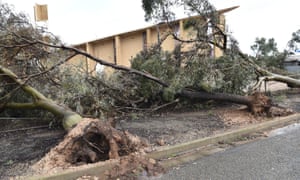Extract from The Guardian
Unburdened by evidence, anti-wind campaigners used the South
Australian blackout to kick off a debate about renewables while others
waited for facts


Normally
natural disasters are off limits to politicking, at least in the period
straight after the event. So it was pretty awful watching politicians
and commentators pushing their anti-renewables message on the back of a once in 50 year storm that hit South Australia and knocked out the electricity grid.These baseless claims led bulletins despite energy industry experts,
upon actual analysis of the situation, reporting that there was no
evidence that renewables are in any way linked to the power outage.
It’s hard to imagine how coal fired power would have remained on without a grid for the electricity to flow through.
Just before the grid shut down, renewables were not offline. Wind energy was busy producing almost 1,000 Megawatts of electricity. The problem was not a lack of renewable power but a storm-ravaged grid that couldn’t get it to the consumers.
Double standard
Do you remember the outrage in October 2013 when people suggested a week after the event that the New South Wales bushfires had been affected by climate change? The then minister for the environment Greg Hunt said at the time:The new minister for the environment, Josh Frydenberg, admitted that the blackout was entirely due to the weather event. But the deputy prime minister, Barnaby Joyce, missed the memo claiming that wind power “wasn’t working too well last night, because they had a blackout”.The debate this week has been an attempt by some to misuse tragedy and suffering and hardship and nobody should do that.
I’m sure that South Australians that have suffered property damage would prefer that politicians focused their attention on helping them, rather than furthering their ideological agendas.
What has happened to our debate when politicians and commentators are happy to use a tragic event to push their anti-renewables agenda with absolutely no evidence, while linking climate change to bushfires and other extreme weather events, for which there is plenty of evidence, is playing politics?
Resilient renewables
The real irony is that an electricity system that has decentralised renewable energy with battery storage would be more resilient to these kinds of storms. Houses and businesses with their own batteries could have kept the lights on even when the grid went down.In the past, renewables were more expensive – but those days are over. Renewable energy has fallen in price and battery storage is close behind. Change in how we produce electricity is coming and an anti-renewables campaign will only slow it and make the transition more difficult.
Rather than attack renewables, the government should be putting in place policies that help with the transition. The economics of renewable energy and the reality of climate change mean that it is inevitable that we will leave fossil fuel electricity generation behind. The question is how can we move to the new energy future in the smoothest way possible?
Renewable energy targets, system changes that make it easier to install battery storage, and a moratorium on new coal mines will all help.
Attacking renewables in the wake of a massive storm might help some people’s political agenda but it will do nothing to help South Australians build a reliable and resilient energy system.
Matt Grudnoff is the Senior Economist for The Australia Institute.
No comments:
Post a Comment